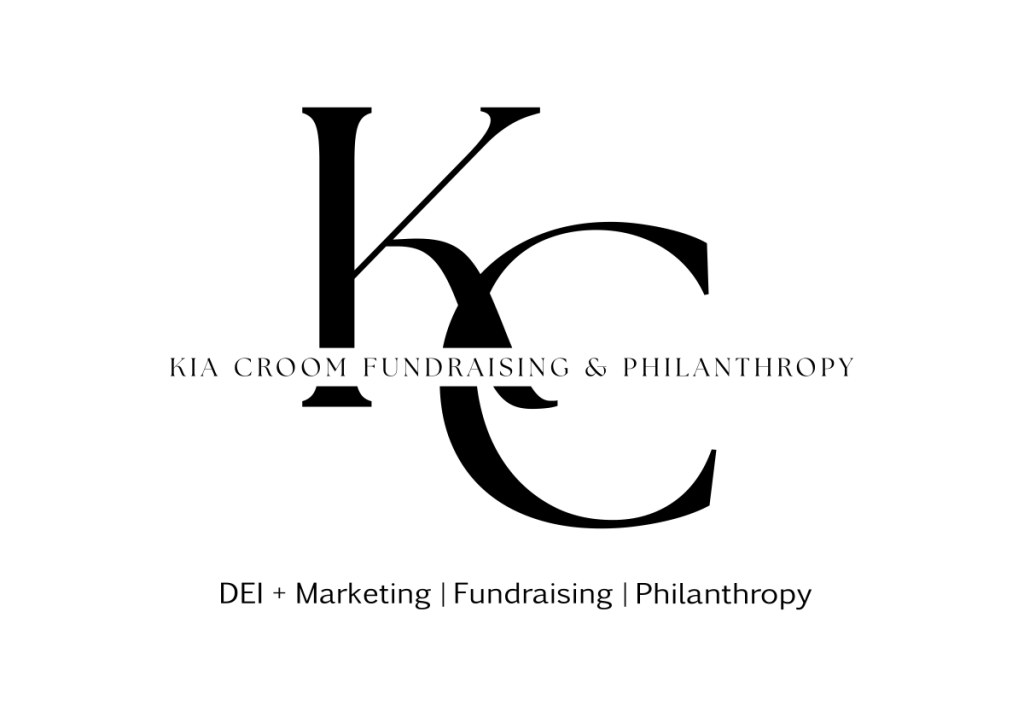Nonprofit Diversity, Equity & Inclusion

Kia Croom is a Diversity, Equity and Inclusion champion committed to challenging nonprofits and philanthropies to become more equitable and inclusive for People of Color. She’s calling for nonprofits to be more intentional about creating more inclusive workplaces with leaders of color, and where employees of color experience belonging and can thrive.
Kia is also calling on the philanthropies to adopt more equitable and inclusive giving policies, and to facilitate their philanthropy through a racial justice lens—ensuring People of color-led nonprofits receive the critical funding they need to carry out their mission-critical work.
In January 2021, Kia announced The Black Fundraisers’ Podcast, which celebrates, inspires and equips Black nonprofit fundraisers to positively impact Black communities.
In June 2021, Kia launched the Decolonize Nonprofits podcast, which provides anti-racist education and exemplars of nonprofit DEI done right for nonprofit workers/leaders and practitioners.
Kia is calling on philanthropic agencies to adopt more equitable and inclusive giving policies, and to facilitate their philanthropy through a racial justice lens to ensure Black-led or BIPOC-led organizations receive their fair share of the critical funding necessary to advance their mission-critical work.
Kia has created a Nonprofit DEI Resource Hub designed to equip nonprofits with tools designed to help improve their diversity and inclusion practices.
Nonprofit Diversity Equity and Inclusion (Nonprofit DEI) Resource Hub
- Anti-Racism Resources for White People
- Absolutely Massive List of Anti-racist Resources for Black Lives Matter Allies
- Scaffolded Anti-Racist Resources
- Ally Resource Guide
- Anti-Racism Resource List
- Free Courses to Help You Become a Stronger Ally and Have Inclusive Conversations
- Anti-Racism Resources for Nonprofit Folx, from Giant Squid Group
- Othering & Belonging Institute
- THE ISSUE OF RACISM IN THE FUNDRAISING PROFESSION
- 5 Tips for Building an Antiracist Culture in Your Fundraising & Development Team w/ Kia Croom
Webinars on Nonprofit Diversity, Equity and Inclusion (Nonprofit DEI)
Whiteness at Work: Reset 2020 – from equity at work – June 11th 2pm EST via Zoom – Desiree Adaway will offer a free training to share concrete ways we see white dominant culture manifest in organizations and actions to mitigate them
Getting Ahead of the Curve with Diversity, Inclusion, and Equity – from Candid – Carly Hare, National Director/Coalition Catalyst at Change Philanthropy will discuss with a birds-eye view of actions being taken across the sector with regards to DEI, and ground the language and frameworks being used.
Beyond the Board Statement: How Can Boards Join the Movement for Racial Justice? – from Nonprofit Quarterly – nationally recognized governance, strategy, and equity consultants Vernetta Walker and Robin Stacia have an in-depth set conversation about how boards of directors can and should join the movement for racial justice.
Whiteness at Work: Reset 2020 – from equity at work – June 11th 2pm EST via Zoom – Desiree Adaway will offer a free training to share concrete ways we see white dominant culture manifest in organizations and actions to mitigate them.
Getting Ahead of the Curve with Diversity, Inclusion, and Equity – from Candid – Carly Hare, National Director/Coalition Catalyst at Change Philanthropy will discuss with a birds-eye view of actions being taken across the sector with regards to DEI, and ground the language and frameworks being used.
5 Tips for Building an Antiracist Culture in Your Fundraising & Development Team w/ Kia Croom
Nonprofit DEI Articles, Blogs, Reports
- Why Do Nonprofits Struggle with Diversity? – by Kishshana Palmer, CFRE
- 4 Steps for Bringing Up Equity and Inclusion At Your Nonprofit – by Mazarine Treyz
- The RACE to Philanthropy – by Michelle Drinks
- 3 Ways To Decolonize Your Nonprofit – by Neesha Powell-Twagirumukiza
- Dear Philanthropy: These Are the Fires of Anti-Black Racism – by Will Cordery
- Have Nonprofit and Philanthropy Become the “White Moderate” that Dr. King Warned Us About? – by Vu Le
- Why Are We Still Struggling with Diversity, Equity, and Inclusion in Nonprofit Governance? – by Elizabeth A. Castillo
- Options and Opportunities for White Social Justice Leaders – by Dani Robbins
- Reparations, the Duty of White Philanthropy, and Posture Necessary to Fulfill It – by Chris Conroy
- Why Diversity, Equity, and Inclusion Matter for Nonprofits – from the National Council of Nonprofits
- Diversity, Equity, and Inclusion in Nonprofit Bylaws – from NEO Law Group
- AWAKE to WOKE to WORK: Building a Race Equity Culture – from Equity in the Center
- Race to Lead – from Building Movement Project
- The Groundwater Approach – from The Racial Equity Institute, LLC
- Building Movement Project “Race to Lead
Nonprofit DEI Tools, Sample Templates and Resources
- Conscious Style Guide
- Hello Seven Guide To Inclusive Language
- Diversity, Inclusion, and Equity Policy Template
- The Diversity, Equity & Inclusion Toolkit
- The Inclusivity Crawler
- Conscious Style Guide
- Hello Seven Guide To Inclusive Language
- Diversity, Inclusion, and Equity Policy Template
- The Diversity, Equity & Inclusion Toolkit
- The Inclusivity Crawler
Nonprofit Diversity, Equity and Inclusion Thought leaders
Thought Leaders on Racial Justice in Philanthropy
- ABFE: A Philanthropic Partnership for Black Communities: ABFE is a membership-based philanthropic organization that advocates for responsive and transformative investments in Black communities. Partnering with foundations, nonprofits and individuals, ABFE provides its members with professional development and technical assistance resources that further the philanthropic sector’s connection and responsiveness to issues of equality, diversity and inclusion.
- CHANGE Philanthropy: CHANGE Philanthropy (formerly known as Joint Affinity Groups) was founded in 1993 to unify identity-focused philanthropic affinity groups into an empowered coalition. CHANGE Philanthropy’s seven core partners are working to integrate diversity, inclusion, and social justice into philanthropic practice, transforming the sector’s culture to be one that embraces equity.
- Funders for Justice: A national network of funders increasing resources to grassroots organizations addressing the intersection of racial justice, gender justice, community safety, and policing.
- Funders for LGBTQ Issues: A network of more than 75 foundations, corporations, and funding institutions that collectively award more than $1 billion annually, including approximately $100 million specifically devoted to LGBTQ issues.
- Justice Funders: Justice Funders is the home of Bay Area Justice Funders Network while also 1) offering professional and leadership development programs, 2) providing coaching and consulting for organizational transformation; and 3) designing, piloting and scaling innovative collaborations that advance social justice movements. By engaging in these multiple areas of programming, Justice Funders is ushering a Just Transition within the field of philanthropy to take a proactive role in building the world we need.
- Philanthropic Initiative for Racial Equity (PRE): PRE aims to increase the amount and effectiveness of resources aimed at combating institutional and structural racism in communities through capacity building, education, and convening of grantmakers and grantseekers.
- D5: In 2007, 50 foundations and allied leaders began the Diversity in Philanthropy Project (DPP), a time-limited campaign to expand diversity in the field. D5 was the culmination of this effort. D5 was a five-year coalition to advance philanthropy’s diversity, equity, and inclusion. As our constituencies become increasingly diverse, we need to understand and reflect their rich variety of perspectives in order to achieve greater impact.
- Darren Walker, CEO Ford Foundation
- Susan Taylor Batten, CEO Association of Black Fundraising Executives
- Edgar Villanueva
COMMON DIVERSITY, EQUITY & INCLUSION LANGUAGE
Diversity
Diversity is the presence of difference within a giving setting. In this case the workplace is the setting and the differences typically refer to identity like race and gender, and sometimes ethnicity, religion, nationality, or sexual orientation. A person isn’t diverse. They’re unique. They can bring diversity to a group though. You’re not looking for a diverse candidate. Diversity is about a collective or a group.
Inclusion
Inclusion has to do with people with different identities feeling and/or being valued, leveraged, and welcomed within a given setting (whether that’s a team, workplace, or industry). Longtime Diversity, Equity, and Inclusion educator, Verna Myers, said: “Diversity is being asked to the party. Inclusion is being asked to dance.” Inclusion isn’t a natural consequence of diversity. You can have a diverse team of talent, but that doesn’t mean they feel welcomed or valued or are given opportunities to grow.
Equity
Equity is an approach that ensures everyone has access to the same opportunities. Equity recognizes that we don’t all start from the same place because advantages and barriers exist. It’s a process that acknowledges uneven starting places and seeks to correct the imbalance. Diversity and inclusion are both outcomes. Equity is not. It refers to the process an organization engages in to ensure that people with marginalized identities have the opportunity
Othering
Othering is a phenomenon in which some individuals or groups are defined and labeled as not fitting in within the norms of a social group. … This process essentially involves looking at others and saying “they are not like me” or “they are not one of us.”
Belonging
Belonging is the feeling of being part of something and mattering to others. We create it through inclusion, which consists of intentional acts. Employees don’t need to be popular or liked by everyone, but they do need to have a sense of belonging somewhere and with someone.

Book a Fundraising Strategy Session with Kia Croom.
-
Book a call
